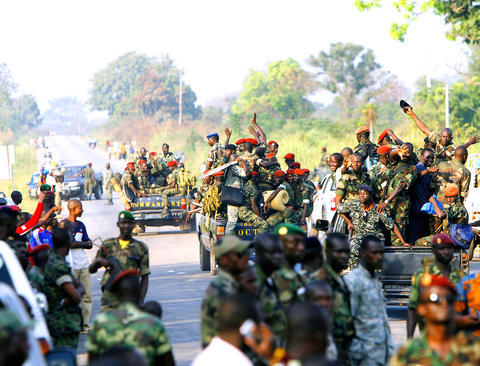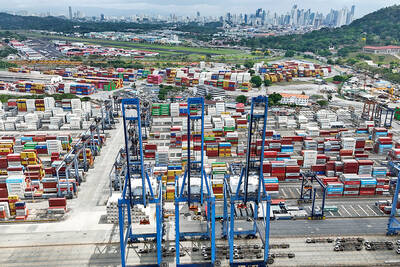Hundreds of rebels and government soldiers withdrew from the former buffer zone that once split Ivory Coast and returned to their barracks in the first stage of a nationwide disarmament program expected to take three months.
Several hundred soldiers who had gathered south of the buffer zone at Tiebissou climbed into trucks on Saturday and drove to an army barracks in the capital, Yamoussoukro.
North of the buffer zone at Djebonoua, rebels also packed into vehicles and headed toward military barracks in their stronghold at Bouake, where they will eventually hand in their weapons to either be integrated into the army or demobilized.

PHOTO: AFP
``Starting today, you will quit the front lines. There is no more front in Ivory Coast," President Laurent Gbagbo told soldiers in Tiebissou, which was in government hands throughout the conflict. Tiebissou is about 350km north of the West African country's main city, Abidjan.
Prime Minister Guillaume Soro, who led the rebellion until a peace deal brokered in neighboring Burkina Faso in March, was also on hand.
``This day is important because this day effectively, concretely marks the beginning of disarmament," Soro said, also speaking in Tiebissou.
Both leaders later headed to Djebonoua to observe rebels withdrawing.
Ivory Coast's warring parties first agreed to disarm during a peace accord reached several months after a brief war erupted in 2002, splitting the nation in two and leaving rebels in control of the north.
In 2004, the government finally announced the start of disarmament, but the bickering parties delayed the process repeatedly -- until now.
Ivory Coast, the world's leading cocoa exporter, was once an oasis of stability in war-ravaged West Africa.
A 1999 coup sparked years of uprisings and eventually war.

THE TRAGEDY OF PUNCH: Footage of the seven-month-old Japanese macaque has gone viral online after he was rejected by his mother and formed a bond with a soft toy A baby monkey in Japan has captured hearts around the world after videos of him being bullied by other monkeys and rejected by his mother went viral last week. Punch, a Japanese macaque, was born in July last year at Ichikawa City Zoo. He has drawn international attention after zookeepers gave him a stuffed orangutan toy after he was abandoned by his mother. Without maternal guidance to help him integrate, Punch has turned to the toy for comfort. He has been filmed multiple times being dragged and chased by older Japanese macaques inside the enclosure. Early clips showed him wandering alone with

South Korea would soon no longer be one of the few countries where Google Maps does not work properly, after its security-conscious government reversed a two-decade stance to approve the export of high-precision map data to overseas servers. The approval was made “on the condition that strict security requirements are met,” the South Korean Ministry of Land, Infrastructure and Transport said. Those conditions include blurring military and other sensitive security-related facilities, as well as restricting longitude and latitude coordinates for South Korean territory on products such as Google Maps and Google Earth, it said. The decision is expected to hurt Naver and Kakao

Australian Prime Minister Anthony Albanese yesterday said he did not take his security for granted, after he was evacuated from his residence for several hours following a bomb threat sent to a Chinese dance group. Albanese was evacuated from his Canberra residence late on Tuesday following the threat, and returned a few hours later after nothing suspicious was found. The bomb scare was among several e-mails threatening Albanese sent to a representative of Shen Yun, a classical Chinese dance troupe banned in China that is due to perform in Australia this month, a spokesperson for the group said in a statement. The e-mail

‘OCCUPATION’: Hong Kong said it had lodged ‘stern protests’ with Panama’s consulate, and would ‘staunchly support’ the rights and interests of Hong Kong companies Panamanian President Jose Raul Mulino on Monday ordered the temporary occupation of two ports run by a unit of CK Hutchison Holdings Ltd following the Supreme Court’s ruling against the firm’s concession, escalating a dispute that has become a proxy battle between the US and China in Latin America. Mulino said in a speech that the administration and operation of the two ports on the strategic Panama Canal is to revert to the country’s National Maritime Authority to ensure their uninterrupted, safe and efficient operation. The occupation covers movable equipment at the ports and does not mean a definitive loss of